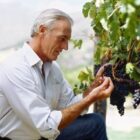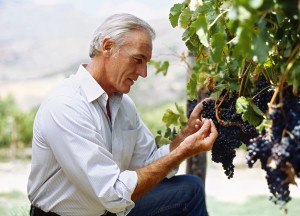
Jun 24, 2014
Choose… to be Fruitful!
by Steven James
As my final installment as this year’s Conference President, and keeping on track in sharing some thoughts about each passage in our Scripture Memory program for 2013-2014, we have one last passage—the “big” one—to tackle. It’s John 15:1-17.
Perhaps it’s “big” not just because it is the traditional “long” one that we can choose to hide in our hearts (or not), but maybe it can also be considered “big” because of what it says about God’s passion for us to be fruitful as His people and to love one another.
I believe that the final two verses of our passage sum up what Jesus said previously: verse 16 echoes the words of being fruitful, which I see as summing up verses 1-8; while verse 17 mentions love, which sums up verses 9-15.
If we take that approach of connecting verse 16 with verses 1-8, then I believe that the fruit of which Jesus speaks is the fruit of others coming to Christ for salvation.
I will focus on the “fruit” aspect.
In this passage are the dynamics of One Gardener, One Vine and many branches. There are two kinds of branches: those who remain in the Vine and those who don’t. There are four levels of productivity among the branches that remain in the Vine: no fruit, fruit, more fruit, and much fruit.
That being said, when we choose to be fruitful—to be a part of what God is doing in drawing others to His Son Jesus Christ (John 6:44)—we are then choosing to:
Be Purified
Jesus speaks of a branch in Him that isn’t fruitful. Bruce Wilkinson (Prayer of Jabez; Secrets of the Vine) hits the nail on the head when he shares how the word usually translated as “cut off” in verse 2 should more fittingly be translated as “lifts up.” This fits the language of the New Testament when the Greek word is used elsewhere, as well as the 1st century ways of caring for vines and branches.
The word picture is of a branch that naturally grows along the ground. It gets covered with dirt and debris, hidden from warmth and light, and thus becomes unproductive.
The gardener will lift that branch up and out of the dirt and debris, cleanse it, and prop it up off the ground where it can receive the necessary dynamics for fruitful growth. Perhaps we need to ask God to raise us up out of the dirt and debris of life and into the warmth of His love and light of His Son so we can start bearing fruit as we’ve been designed to do!
Be Pruned
After a branch is lifted up (v. 2a) and is now becoming productive, it needs pruning from time to time to become even more productive. While there may be “pretty green leaves” on a branch, that is not the purpose of a fruit-bearing branch.
How much of our life as Christians, as churches, and as a Conference are made up of producing leaves but not fruit? God the Father, as the Master Gardener, wants us to produce fruit—not just be covered with “leaves.” As such, He will prune out of our lives that which hinders production.
Be Partakers
Jesus repeated several times our need to remain connected to Him as the vine. The only way for us as branches to be productive is to partake from Him as the vine—the source of our life! One source of nourishment is alluded to, I believe, in this passage: that of the life-giving vitality of the words of Jesus Christ (v. 8).
Persevere
Jesus uses the term “abide” or “continue” in this passage a number of times. He stresses how we, as branches, need to ”remain” in Him and what happens if one should remove himself from Jesus as the vine (v. 6). This is a different perspective from that of the branch mentioned in verse 2, as that branch is one that still remains in the vine, although not productive. To “continue in” something—or to not “remain in” something—one has to be “in” that something to begin with. Jesus didn’t say that one was to “get in” or to “stay out,” but rather to “continue, abide or remain”—with the opposite being to “get out; leave; or remove oneself.”
Be Productive
Jesus alludes to a real progression of productivity. We go from being unproductive and needing to be lifted up out of the dirt (v. 2a), to being productive but needing to be pruned so as to be “more productive” (vv. 2b-3), to being “very productive” (vv. 5 & 8). God doesn’t stop at “level one” or “level two,” but seeks the maximum amount of fruit possible as He tends to us as branches.
Why should we also have such a desire for “much” fruit? Because it brings the most glory to God, and it is proof of being Jesus’ disciples (v. 8). We heartily sing of how proof of our discipleship is “love,” and rightfully so. But lots of fruit is also proof!
Be Prayerful
The aspect of prayer should permeate the whole process. We are often too quick to get moving without checking first if that is where God is moving. (Remember last year’s Conference theme?) We can therefore end up with lots of green leaves and little fruit—all because we don’t take time to pray and then obey.
Proclaim
With all of the pieces in place—being purified from the dirt and debris that life dumps on us; being pruned of what hinders growth; being partakers of the True Vine; and having a persevering, productive and prayerful attitude—we are then to proclaim. I find that dynamic in the two-letter word in verse 16 as Jesus sums up verses 1-8: “…that you should GO and bear fruit.”
That little word, which occurs in the other gospels as part of what we call the “Great Commission,” oftentimes becomes our “great omission.” We don’t “go” and we don’t “proclaim” or share our saving faith with those who don’t know Jesus, and our Sabbath faith with those who do know Him.
Fulfilling this commission, I believe, is one of the primary reasons for our recorded notable growth as churches and a Conference in the 1800s. Letting it become our great “omission” is one of the reasons, I believe, for our decline in the 1900s.
Yes, in terms of memorization, the passage of John 15:1-17 is “big.” However, in terms of our “mission” as churches and a Conference, it is extremely “big” should we choose to be fruitful!


